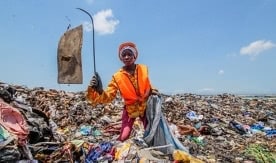Turning the COVID-19 Crisis into an Opportunity: What’s Next for Social Protection?
-
October 6, 2020 - October 8, 2020
- Online

The October 6-8 global e-conference “Turning the COVID-19 Crisis into an Opportunity: What’s Next for Social Protection?” provided a space to evaluate, share experiences on and learn about social protection responses to COVID-19 and allowed the community to discuss the future of social protection in a post-pandemic scenario.
Laura Alfers, Director of WIEGO’s Social Protection Programme, was an expert contributor to various panels on October 6, including a session co-hosted by ILO and WIEGO: “Linking – and transitioning between – non-contributory (social assistance) and contributory (social insurance) social protection for informal workers and beyond”. She focused on how the COVID-19 pandemic was affecting informal workers and raised awareness of the needs of informal workers.
WIEGO’s Deputy Director of Social Protection, Rachel Moussié presented for WIEGO and the Global Coalition for Social Protection Floors at the October 8 Expert Panel Discussion 2: Implications of the COVID-19 Crisis for Universal Social Protection. This panel focused on how to sustain the social protection responses that emerged during this crisis. Also, it debated how to ensure equitable access to comprehensive risk coverage for the entire population through a coherent system.
Here’s more about WIEGO’s activities at the conference:
October 6th:
There was a WIEGO/ILO Virtual Booth: Extending Social Protection to Workers in the Informal Economy in the COVID-19 Crisis and Beyond. At 7am on October 6 there was time to discuss what was in the booth.
Clinic 5A: Linking social protection, employment & economic inclusion.
This thematic clinic provided an opportunity to ask – and answer – questions on the topic of linking social protection responses to employment and economic inclusion initiatives, in the short and medium/long term. How have other countries been doing this? What does the evidence show?
‘Clinic’ sessions were an opportunity for participants to ask practical, technical questions on various topics that have been very relevant to the COVID social protection response. These were either answered ‘live’ or via a subsequent written discussion forum. The sessions were staffed and moderated by designated ‘experts’ on that topic, but answers were provided by peers as well: we are all experts and can all learn from each other’s country experiences.
Roundtable 4: Unemployment protection and informality in the COVID-19 crisis.
Clinic 7A: Linking and transitioning between social assistance and social insurance for informal workers and beyond.
This thematic clinic provided an opportunity to discuss issues around the centrality of links between non-contributory (social assistance) and contributory (social insurance) elements of social protection systems, including on
October 8th:
Expert Panel Discussion 2: Implications of the COVID-19 crisis for universal social protection.
This panel focused on how to sustain the social protection responses that emerged during this crisis in the long term. Equally, it debated how to best ensure equitable access to comprehensive risk coverage for the entire population through a coherent system in the future.